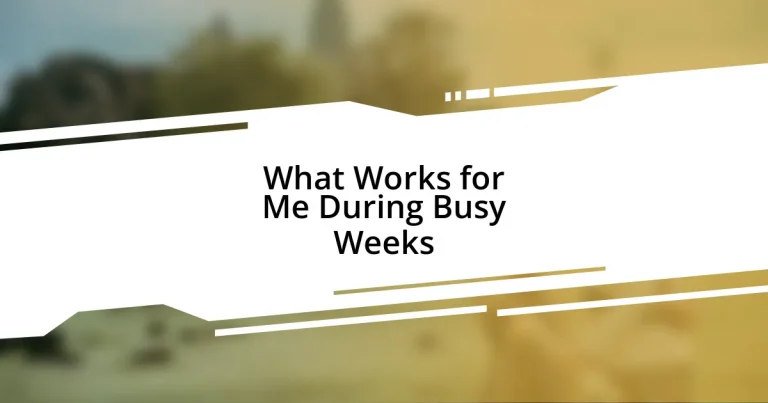Key takeaways:
- Busy weeks require not only time management but also emotional resilience; recognizing what tasks energize or drain you is crucial.
- Prioritizing tasks effectively by using methods like deadline tracking and the Eisenhower Matrix helps manage workload and mental energy.
- Implementing a flexible schedule, including time-blocking and regular weekly reviews, enhances productivity and reduces stress.
- Reflecting on weekly achievements fosters gratitude, highlights personal growth, and helps manage stress and emotional pressure.
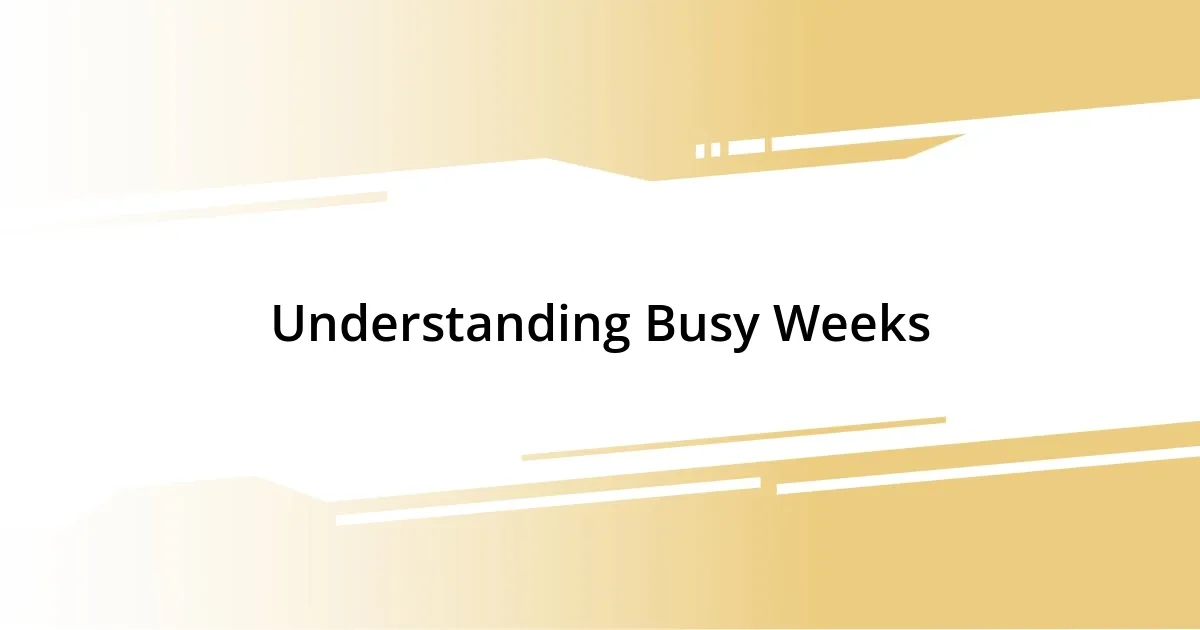
Understanding Busy Weeks
Busy weeks can feel overwhelming, like being caught in a whirlwind. I remember a time when six back-to-back meetings left me drained by mid-afternoon. It wasn’t just the scheduling; it was the emotional rollercoaster that came with each discussion—anticipation, stress, and the push to stay focused. Have you ever felt that tension rising when you know there’s just too much on your plate?
The truth is, busy weeks don’t just require time management; they demand emotional resilience too. I learned this the hard way during one particularly chaotic week when I mixed up deadlines and felt the weight of my clients’ expectations. It made me realize that it’s not just about the tasks at hand but also about how we handle the pressure they bring. How do you cope when the count of tasks seems to multiply by the hour?
Understanding busy weeks means recognizing what’s at stake emotionally. For me, it’s acknowledging which commitments energize me and which drain my spirit. I now try to carve out little pockets of calm, even during the busiest of days. Do you remember a moment in the midst of chaos when a simple breath or a cup of tea brought you back to center? It’s those reflections that can turn an overwhelming week into something manageable.
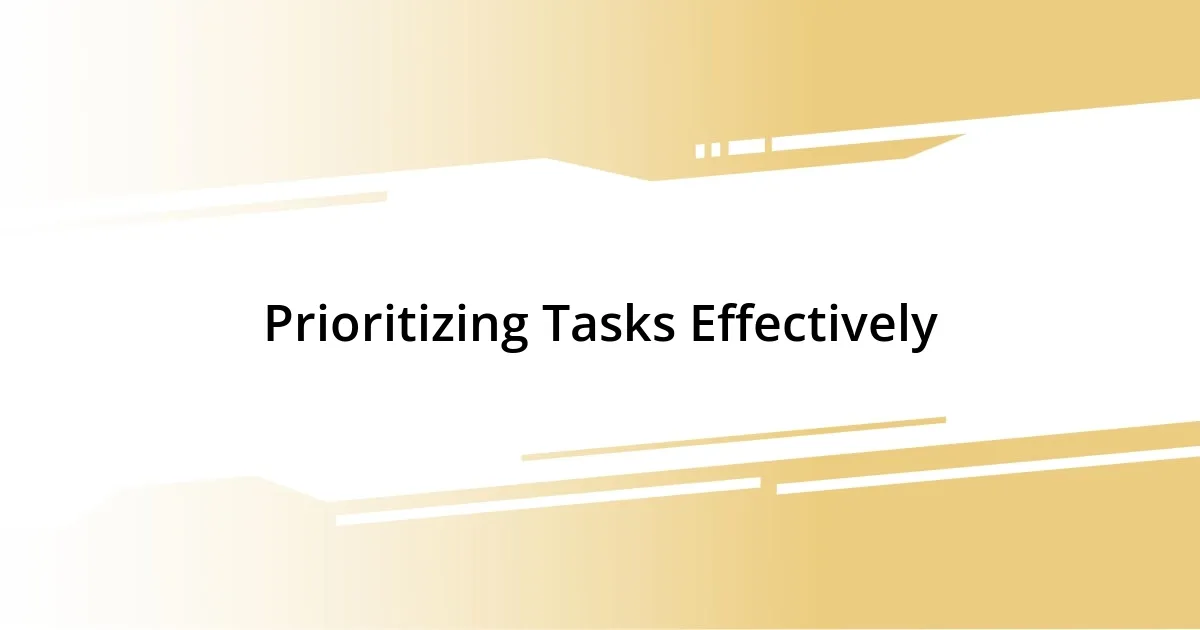
Prioritizing Tasks Effectively
When it comes to prioritizing tasks effectively, I’ve discovered that breaking everything down into manageable pieces is invaluable. I often start my busy weeks by listing out all my commitments and then ranking them based on urgency and importance. There’s something almost calming about putting those thoughts on paper; it transforms a chaotic mind into a clearer roadmap. Once I see everything laid out, I can more easily identify what needs my immediate attention and what can wait.
Here are some helpful strategies I’ve developed over time:
- Identify Deadlines: List out tasks by their due dates—this helps to visualize what’s pressing.
- Use the Eisenhower Matrix: Break tasks into four categories: urgent and important, important but not urgent, urgent but not important, and neither.
- Limit Your Focus: I find it helpful to choose the top three tasks that need my attention each day, minimizing the overwhelm.
- Reflect and Adjust: At the end of the week, I like to review what went well and what didn’t, so I can adjust my strategies moving forward.
This approach has allowed me to tackle even the busiest days with more confidence. It’s powerful to realize that by prioritizing effectively, I’m not just managing my time—I’m also preserving my mental energy.
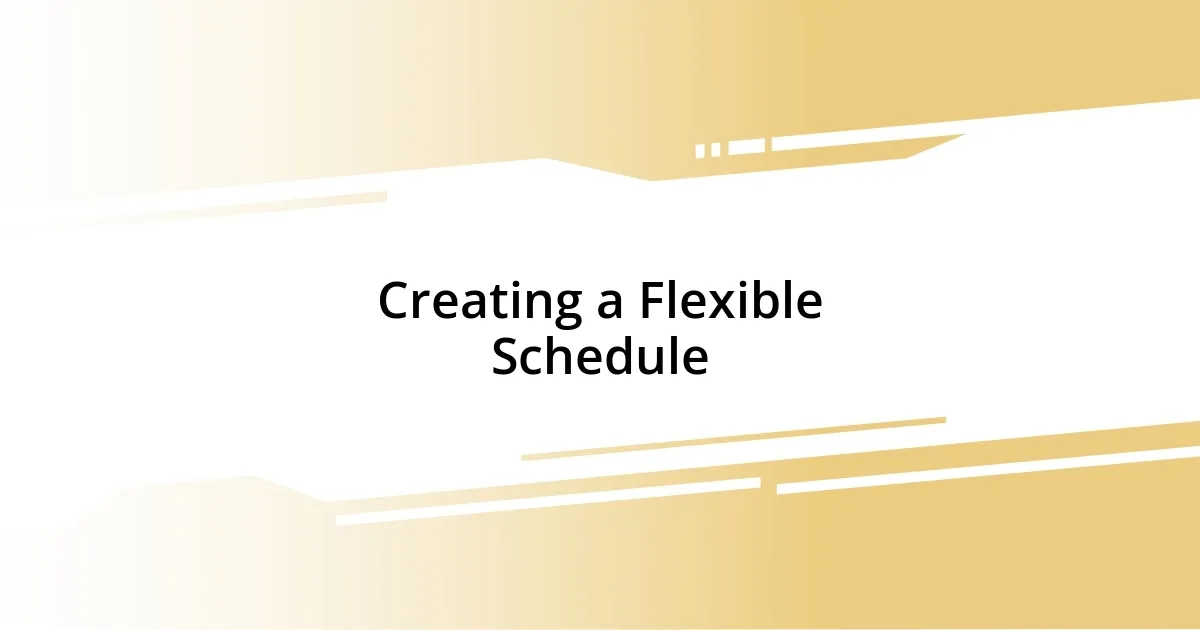
Creating a Flexible Schedule
Creating a flexible schedule is essential for navigating the whirlwind of busy weeks effectively. Personally, I’ve found that allowing myself the freedom to adjust my plans as the week unfolds makes a significant difference. For instance, there are days when an unexpected project or an urgent phone call can disrupt my carefully laid plans. Instead of feeling frustrated, I’ve learned to embrace this unpredictability and shift my focus to what’s most pressing in that moment.
One strategy I’ve adopted is time-blocking, where I assign specific periods for distinct tasks while keeping gaps in my schedule for unplanned events. On particularly hectic days, I block out time in the afternoon for potential overruns or quick breaks. This gives me peace of mind knowing that if a meeting runs long or I need to catch my breath, my day doesn’t spiral out of control. Have you ever experienced that heart-sinking feeling when a meeting starts to eat into your lunch? Recognizing this feeling has helped me incorporate buffer times, so I’m never left scrambling.
Moreover, I always perform a weekly review to gauge what worked and what didn’t. Reflecting on my flexibility gives me insights into my patterns and allows me to adjust future schedules accordingly. Last month, I realized that having meetings stacked back-to-back left me mentally exhausted. By spreading them out and allowing time for reflection or short walks in between, I’ve found a balance that enhances my productivity. It’s amazing how small shifts can yield significant improvements in energy and focus.
| Flexible Schedule Techniques | Description |
|---|---|
| Time-Blocking | Assign specific time periods for tasks, allowing for gaps to manage unplanned events. |
| Weekly Review | Analyze what strategies worked and adjust for future schedules to improve efficiency. |
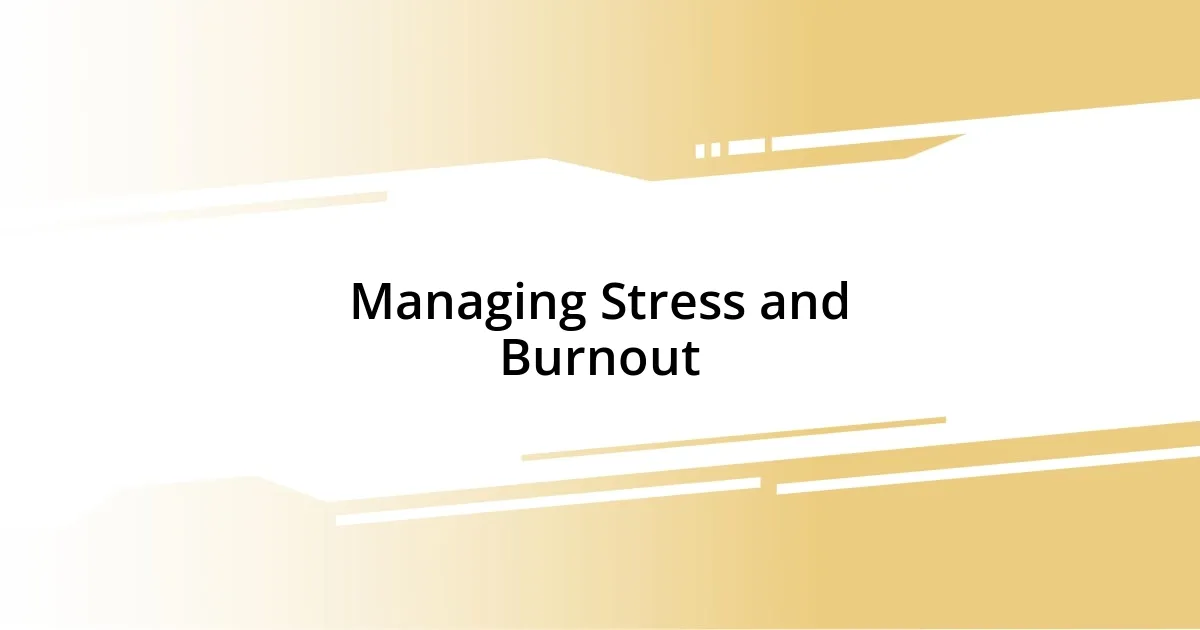
Managing Stress and Burnout
Managing stress and burnout has been an essential part of surviving my busiest weeks. I’ve learned that setting aside just a few minutes for mindfulness practices, like deep breathing or short meditations, can transform my mental state. Have you ever felt the weight of tasks pressing down on you? I certainly have, and it’s during those moments that just focusing on my breath for a few cycles can bring clarity and reduce anxiety.
Another powerful tool I’ve embraced is physical activity. On especially hectic days, taking a brisk walk or engaging in a quick workout can work wonders for my mood. I remember one week when deadlines stacked up, and I felt overwhelmed. Instead of sinking deeper into my work, I decided to step outside for a 20-minute walk. Surprisingly, that short break not only refreshed my mind but also sparked new ideas for my projects. It’s incredible how a change of environment can rejuvenate your perspective.
I also prioritize social connections to help alleviate stress. I’ve found that reaching out to friends, even just for a quick chat, can provide a much-needed emotional boost. A good laugh or sharing a relatable struggle can remind me that I’m not alone in this chaos. Have you ever tried connecting with someone only to realize how much lighter you felt afterward? It’s a simple yet profoundly effective way to manage stress that I now incorporate into my routine, especially during those demanding weeks.
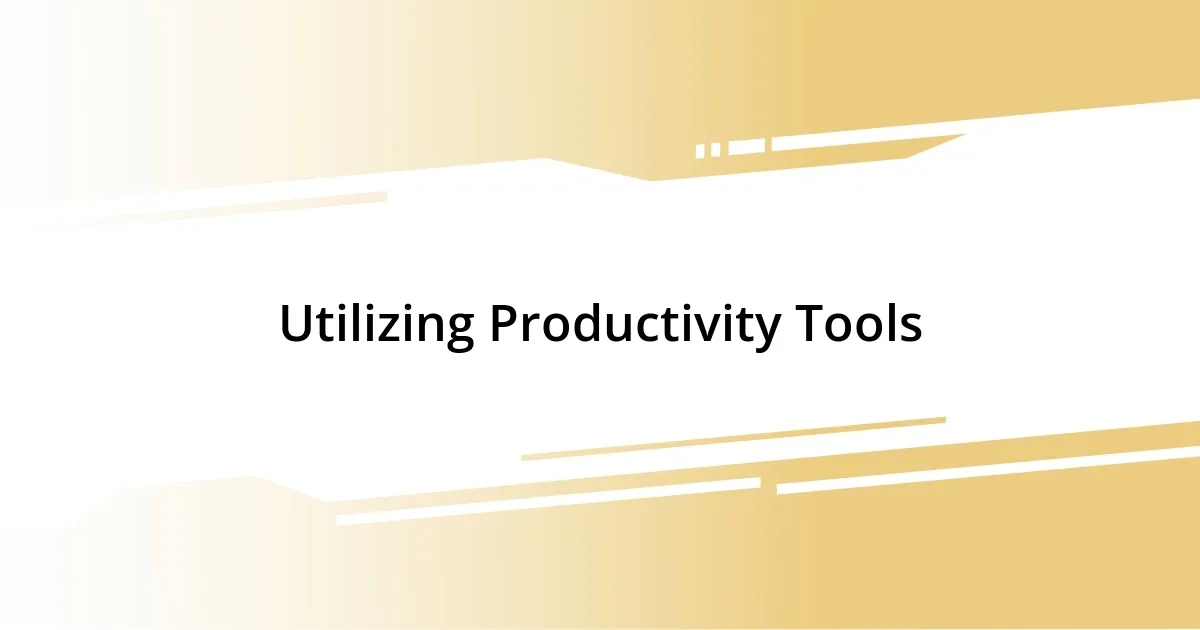
Utilizing Productivity Tools
Utilizing productivity tools has been a game changer for my hectic weeks. One of my go-to favorites is a task management app. I remember the chaos of juggling several projects and feeling like I was constantly writing lists on scraps of paper. Switching to a digital tool helped me centralize everything and gave me the satisfaction of checking tasks off visually. It’s like using technology to give my brain a breather. Have you ever felt overwhelmed by loose ends? A tool like this can keep you organized and focused, preventing that dreaded feeling of chaos.
Additionally, I’ve discovered the power of automation. Tasks that used to drag on can now be streamlined. For instance, scheduling social media posts ahead of time has saved me countless hours each week. I recall when I used to panic each time I needed to post something. Now, with automation, I can set everything up in a batch and forget about it. This frees up my mental space for more creative endeavors. Isn’t it liberating to know that some of your routine tasks can run on autopilot?
Lastly, I can’t stress enough how valuable calendar apps have been for me. They help me visualise my week at a glance, which has drastically reduced the stress of overlapping commitments. I’ll never forget one busy Tuesday when I accidentally double-booked a meeting and a lunch date. That experience taught me to rely on my calendar more. Now, I make it a habit to check and update it daily. Isn’t it comforting to look at your week and know exactly what’s coming up? Using these tools not only enhances my productivity but also brings a sense of control over my time, allowing me to breathe a little easier.

Establishing Healthy Boundaries
Establishing healthy boundaries has become essential for maintaining my sanity during busy weeks. I vividly recall a time when I felt stretched too thin, trying to be available for everyone while neglecting my own needs. It was during a particularly overwhelming period that I realized saying “no” can be just as empowering as saying “yes.” Have you ever felt guilty for prioritizing your own well-being? I learned that I don’t have to carry others’ expectations on my shoulders.
One strategy that’s worked wonders for me is communicating my limits transparently. I’ve found that being upfront about my availability helps manage expectations effectively. There was a point when a friend constantly asked for my help with projects, and I knew I couldn’t commit without compromising my own deadlines. So, I had an honest conversation about my workload, and surprisingly, it deepened our friendship. Isn’t it refreshing to establish clarity instead of letting misunderstandings linger?
Lastly, I’ve discovered the importance of creating downtime in my schedule. I used to fill every free moment with tasks, thinking it was productive. But I now carve out pockets of time just for me, whether to unwind with a book or simply sit in silence. On a particularly hectic week, this became my refuge. I realized that by taking these breaks, I returned to my responsibilities with renewed energy and focus. What about you? Have you found that establishing those pauses helps refill your cup, too?
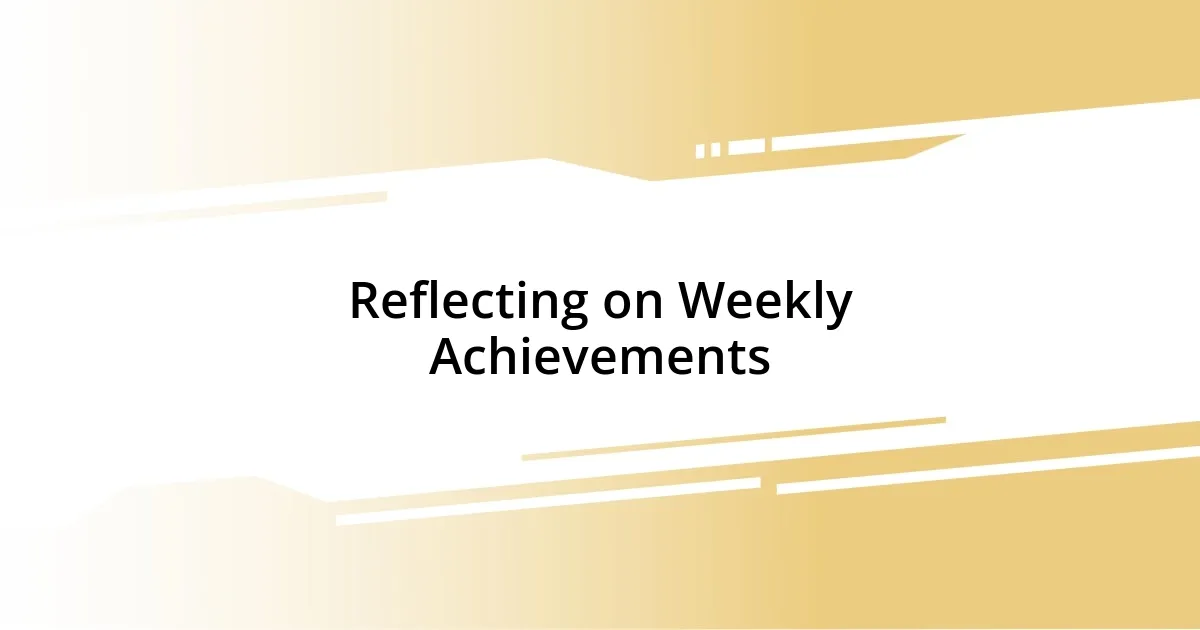
Reflecting on Weekly Achievements
Reflecting on my weekly achievements has become a crucial habit in my life. At the end of each week, I take a moment to sit down with a cup of tea and write out what I accomplished. Just last Friday, I found myself amazed at how much I had tackled, from completing a significant project at work to finally organizing my home office. It’s incredible how acknowledging these small victories can shift my mindset, and I often ask myself, “What have I learned from this week?”
What stands out to me is how reflecting emphasizes not just the tasks, but the growth that comes from them. I remember a busy week where I felt like I was just treading water, but when I listed everything out, I realized I’d developed skills I didn’t know I had. Wasn’t that an eye-opener? Sometimes, I catch myself getting bogged down by the daily grind, forgetting that every challenge is a potential learning opportunity. Reflecting helps me foster gratitude and enhances my motivation for the upcoming week.
I also think about the emotional side of reflection. It’s easy to overlook the stress and pressure, but when I revisit my week, I can acknowledge those feelings instead of brushing them aside. This past week had its ups and downs—juggling family responsibilities on top of work was no walk in the park. Yet, writing it all down and acknowledging those tough moments allowed me to appreciate the resilience I was cultivating. Don’t you think this kind of honesty with ourselves is vital? It’s not just about the achievements; it’s about embracing the journey, foibles and all.












